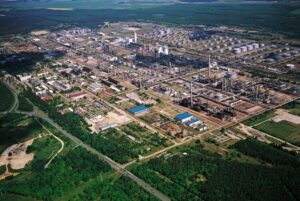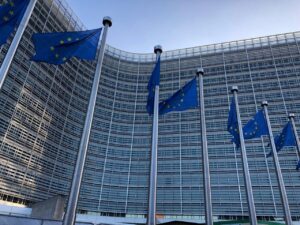It looks like the Germans got scared of the impending US sanctions against Nord Stream 2. They are suspending the construction of infrastructure, which was supposed to distribute gas from the pipeline, writes Wojciech Jakóbik, editor in chief of Biznesalert.pl.
According to BiznesAlert.pl, Bundesnetzagentur (BntezA) the German agency responsible for the gas transmission network announced changes in the infrastructure development plan until 2026. The officials believe that the construction of connections needed to transmit the raw material via Nord Stream 2 should be postponed until the required permits for the investment are acquired.
This pertains to a network of gas pipelines, which will transmit gas from Nord Stream 2 to the south and west of Germany. EUGAL, is among five such investments. It is a gas pipeline that will go along the existing line of Nord Stream 1 called OPAL. The enumerated pipelines and their branches together with the Russian Ukhta Torzhok (completed) and Ukhta Torzhok 2 (under construction) are to constitute the Northern Corridor, a distribution system for Russian gas across the territory of our neighbors with the elimination of traditional transit countries and Ukraine in particular.
However, the US Senate adopted new sanctions that target Russia and include the option to encompass companies engaged in Nord Stream 2, which has been deemed harmful in the bill. BnetzA’s reaction shows that the German regulator is seriously considering blocking the project. It did not make this move when the European Commission announced it would ask for a negotiation mandate from Member States to determine the legal regime for Nord Stream 2, most probably it hoped that Berlin would block the talks or made sure the mandate is in line with its interests.
Washington forced the German regulator to send a noticeably negative signal to Nord Stream 2 investors, even before the new US sanctions enter into force as they are waiting for President Trump’s signature. This means it expects the President will sign the bill. Perhaps this is the source of nervousness recently displayed by Jean-Claude Juncker President of the European Commission, who stated that the actions taken by the US were uncoordinated and destructive towards the symmetry between the US and Europe.
In this context it is worth reminding that it was not the first time when Americans decided to take more radical actions. It happened before when they adopted sanctions against the Yuzhno-Kirinskoye project in 2015 and blocked the cooperation between Shell and Gazprom in the LNG sector in Asia. Also when it comes to Iran Americans are less liberal than Europeans.
However, it is the unclear actions taken by the European Commission that undermine the West’s credibility in relations with Russia. This pertains to such issues as lack of decisions and a soft treatment in the antitrust investigation against Gazprom, or the concessions regarding OPAL questioned by Poland and its allies in court. Other problems include the relativization of EU law caused by the proposal to hold EC-Russia talks on Nord Stream 2, which threaten the European efforts in Ukraine. The negotiations alone may actually delay the project, which would be relatively beneficial for Ukraine.
We should closely watch how European companies engaged in Nord Stream 2 will react, those are BASF/Wintershall, E.on/Uniper, ENGIE, OMV and Shell. The German regulator pressed pause for projects without which the transmission, i.e. effective gas sales from the proposed pipeline will be impossible. If because of US sanctions, the Nord Stream 2 project does not receive a construction permit, the mentioned companies will lose significant money. According to various estimates, the project will cost EUR 9.5-11 bn. and it has already received 5 bn. in loans in Europe.
In the communication on the five investments one can read more. The paragraph about this subject is titled: removal of uncertain projects (i.e. from the plan). The projects related to Nord Stream 2 are therefore deemed 'uncertain.’ This is a clear signal to investors.
BnetzA said that the project should be included in the 2026 investment plans only when a permit for Nord Stream 2 construction is issued. The construction itself is described as the expansion of Nord Stream 1 in the communication. This is a remnant of a narrative which says that the new Russian and German project is just a continuation of the one that had been already completed and thus all of its rights are bestowed on Nord Stream 2, including the fact that the EU excluded it from EU regulations. As we all know, the EC did not believe that Nord Stream 2 could be constructed in a legal void as was its predecessor, which had been built before the Third Energy Package’s antitrust law entered into life.
It is worth reminding that the permit to build Nord Stream 2 will be granted only after the Environmental Impact Assessment has been conducted. Denmark is one of the countries that has the right to issue such a document. Copenhagen is considering whether it should withhold its consent until the EC-Russia negotiations are over. If BnetzA waits with constructing the ancillary infrastructure for Nord Stream 2 until the permit is granted, and if the EC – Russia negotiations take months or years, the project will have at least a serious delay. For Poles this is a fight worth fighting for because delaying the pipeline from 2019 until 2022 is enough to implement diversification projects of the Northern Gateway without an increasing market pressure from Gazprom, those include: expansion of the LNG terminal and the Norwegian Corridor, i.e. Baltic Pipe.








